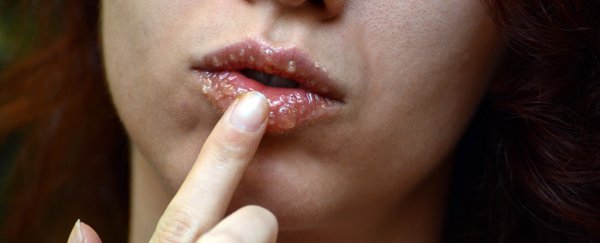If you're among the one in three readers prone to frequent cold sores, there's every chance you keep a tube of virus-busting acyclovir cream in your bathroom cabinet in anticipation of that next blister.
Turns out medical grade honey made from kānuka (Kunzea ericoides) blossoms might be just as effective. Pending further research, the find could offer those who suffer the effects of the herpes virus a wider choice in treatments.
A clinical trial led by the Medical Research Institute of New Zealand (MRINZ) tested claims that a more natural alternative to antiviral creams could do just as good a job at reducing the amount of time a cold sore spends on your face.
It's fair to say that most of you have the herpes simplex virus in your body. And of those who do, up to nearly half will experience the uncomfortable, awkward eruption of the virus in the form of a blister on an outer mucosal membrane, such as the nose or lips.
Quickly attacking it with a cream containing acyclovir should speed up the healing time by a day or two. It doesn't sound like much, but that relief is a welcome one, not to mention less time blisters have for shedding the virus.
While it's usually a fairly benign treatment, acyclovir isn't completely free of potential side-effects. There are also plenty of people who simply don't like the thought of rubbing on something that sounds like a Harry Potter spell.
Meanwhile, honey has been used for centuries to treat infections, falling aside mid-last century once the silver bullet of broad spectrum antibiotics took centre stage.
The growth of a medical counter-culture in recent decades has revived interest in this medicinal classic, with claims that honey can boost energy, improve sleep, fight infections, and 'detox' your liver.
Pulling apart the truth from the wishful thinking requires time and effort, not to mention a whole lot of dollars.
While independent and private research companies often fund searches for potential chemical treatments in nature's pharmacopoeia, proponents of alternative therapies can be reluctant to expose their potential remedies to scientific scrutiny.
"There are significant barriers relating to both cost and quality assurance in order to meet strict New Zealand regulatory requirements for clinical trials and, of course, there's always the risk the results may prove negative," says medical researcher Alex Semprini.
The remedy being evaluated isn't just any old store-bought jar of bee spew, but is of medicinal grade, meaning it is sterilised and theoretically contains more antimicrobial ingredients.
You might have come across a common medicinal honey based on the mānuka plant (Leptospermum scoparium), a myrtle that's endemic to New Zealand and Australia.
Kānuka isn't all that different, made from a botanical cousin that's found throughout New Zealand's lowland and mountain scrublands, and on the margins of forests.
The researchers combined kānuka honey with glycerol and compared the mix with a cream of 5 percent acyclovir. Each topical treatment was then allotted randomly to 952 volunteers, who were instructed to apply treatment within the first 72 hours of noticing an outbreak, repeating it five times a day until the blisters vanished.
Tallying up the figures, those who used the acyclovir on average experienced symptoms for 8 to 9 days, and had an open blister for about 2 days.
For those who used honey, the results weren't significantly different, suggesting there just might be something to these claims after all.
"This means that patients with a preference for natural and alternative medicines, as well as pharmacists who sell these treatments, can have confidence in the effectiveness of this kānuka honey formulation as a further treatment option for cold sores," says Semprini.
That confidence comes with a couple of caveats.
For one thing, this wasn't one of those gold-standard, double-blind kinds of clinical trial. That doesn't make it useless, but since volunteers could easily tell whether they were rubbing in acyclovir or honey-flavoured glycerol, the results could be swayed.
Ideally, all science funding would be independent, bias free, and rain freely from the skies. We can live in hope. In this case a New Zealand company called HoneyLab put their money where their mouth is and contributed funding to look into a remedy they sell.
So, we have every reason to be cautious. But if we take this in context with other studies suggesting honey might contain a trove of compounds worth analysing for medicinal value, we shouldn't be too quick to dismiss the study out of hand either.
Further research could help identify the mechanisms potentially responsible for the honey's effects on herpes infections, and maybe even lead to more powerful therapies than we have now.
One in three of you would be grateful for that sweet news.
This research was published in BMJ Open.
